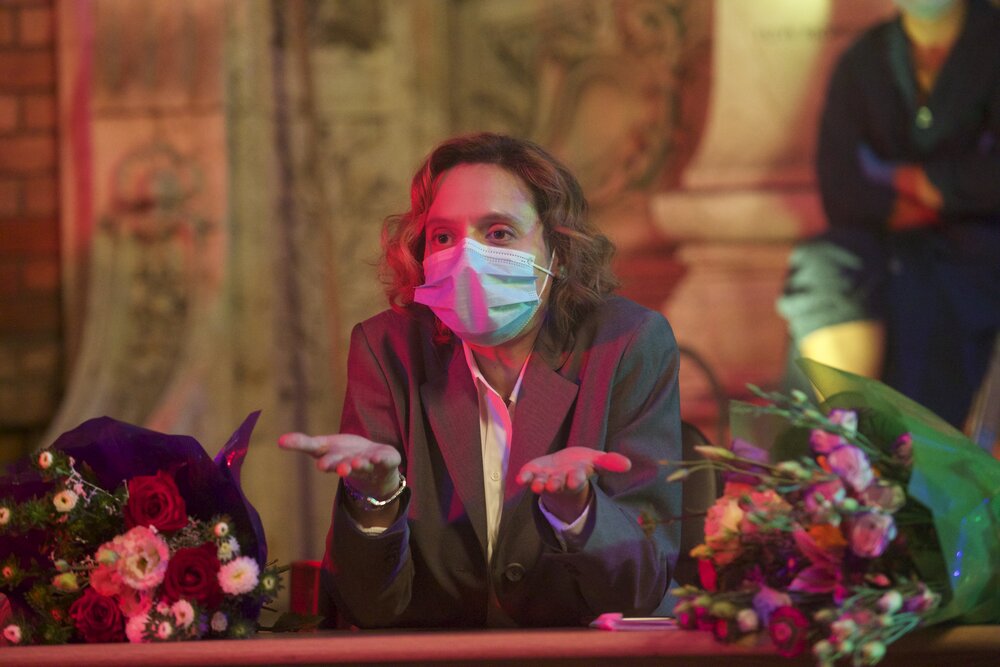
Bad Luck Banging or Loony Porn
Magnolia Pictures
Reviewed for Shockya.com by Abe Friedtanzer
Director: Radu Jude
Writer: Radu Jude
Cast: Katia Pascariu, Claudia Ieremia, Olimpia Malai, Nicodim Ungureanu
Screened at: Critics’ link, LA, 11/16/21
Opens: November 19th, 2021
Some people just aren’t all that comfortable with sex. There are cultures in which public nudity, in the appropriate contexts, is more accepted and normalized, and others where any mention of sexual desire or intimacy is considered taboo. There are also environments in which people feed their appetites for something they might not otherwise be able to attain that are accessible through private and often illegal channels. When something a person does in their own home and their own life becomes public, the reaction can be swift and harsh, but that response may be indicative of other truths buried beneath the surface.
Emi (Katia Pascariu) is a well-liked teacher at her school facing an unfortunate and inescapable situation. A graphic video of her having sex with a partner has been uploaded to the Internet, and though she has been able to have it taken down, the parents have seen it, and the administration is preparing to deal with it and reconsider Emi’s continued employment. Bad Luck Banging or Loony Porn showcases Emi’s debacle in three parts, beginning with her attempting to get things under control, interrupting the narrative with a series of references to words and expressions with subversive meanings, and concluding with a town hall of sorts where Emi’s fate will be decided by a group of extremely judgmental and unforgiving parents.
It’s hard to properly categorize this film, which opens in an entirely uncensored way that may shock American audiences with its explicit portrayal of sex acts. From there, it establishes itself clearly as a Romanian film, with deliberate pacing reminiscent of past exports like 4 Months, 3 Weeks and 2 Days and Police, Adjective. Emi’s circumstances are certainly lamentable, and she is powerless to do much about it as she walks through Bucharest from place to place, and by the time the school has convened a council to determine what will happen, audiences will have no idea what to expect given its stark shift to straightforward storytelling with continuous dialogue.
The fractured structure of this film makes for a dizzying experience, one that might be less than inviting or commanding from the time its jarring opening video ends until its “playful essay on obscenities” begins. It’s an experimental format, one that makes its transformation back into a standard film in its third act all the more surprising. But what comes before it seems purposeful, indicative of the mundanity that rules all extraordinary scenarios and the intense influence of pop culture and pervasive ideologies on any opinion that people express.
Following its unusual approach in its first two parts, the film’s third act, which finds Emi sitting masked in front of a group of parents gathered outside during the coronavirus pandemic, may be its most triumphant and emphatic. It’s easy – and horrifying – to see how what might be deemed legitimate concerns about the exposure of their children to an instructor whose naked body has been seen engaging in what they deem lewd behavior morphs quickly into vicious conspiracy theories. Objections to Emi teaching about the Holocaust are raised that turn into accusations that she must be a scheming Jew, who is therefore responsible for all actions of the Israeli government. The leap is big and obviously absurd, but the concept that it could happen is unfortunately not nearly as unbelievable.
This film, whose title is almost as memorable as its content, is a satire but one that smartly picks up on and shines a light on elements of people everywhere that they would rather not have revealed. Emi having her sex tape seen by the world is just one form of that, and the parents revealing their prejudices and hatred is another. This film’s scenes are specific to the culture of Romania but also applicable worldwide, showing how parody is often the best way to showcase reality. Its final scene is altogether baffling and ridiculous, mystifying but also consistent with the message that judging anyone else usually says just as much as the jury as it does the accused.
106 minutes
Story – B
Acting – B+
Technical – B+
Overall – B
